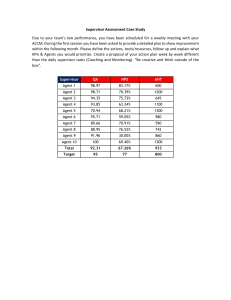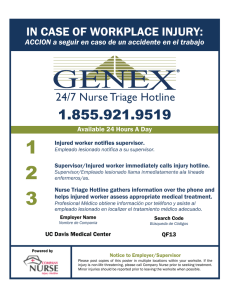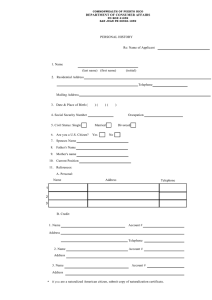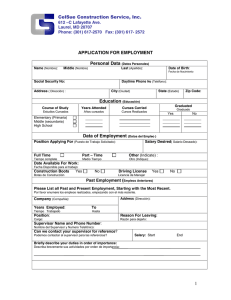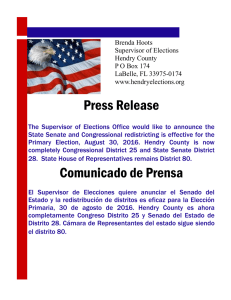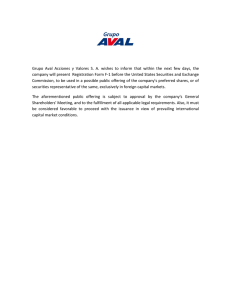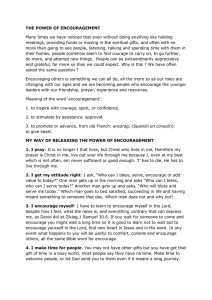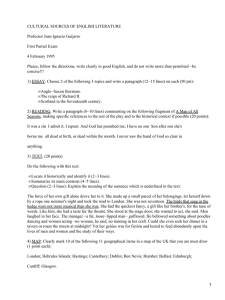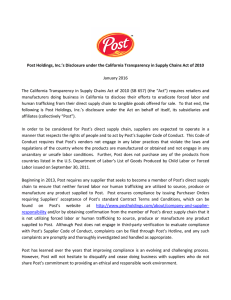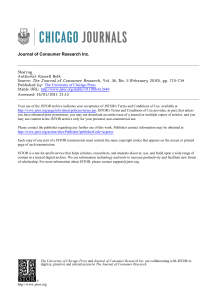LafargeHolcim Code of Business Conduct
Anuncio
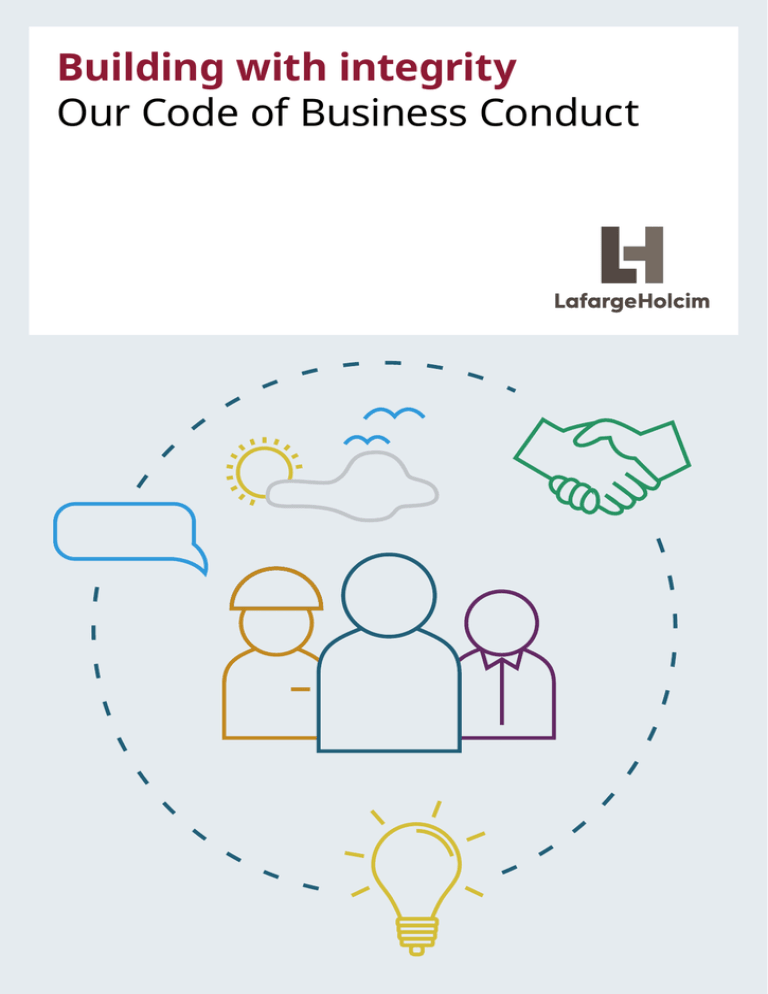
Building with integrity Our Code of Business Conduct 02 LafargeHolcim Code of Business Conduct High performance with high integrity is key to sustainable success. Acting with integrity creates trust, protects our reputation, lowers our cost of doing business, and enhances shareholder value. Acting with integrity is about doing the right thing all the time and starts with behaving in compliance with our Code. It is our duty to act with integrity and to enable others to do the same. LafargeHolcim Code of Business Conduct Table of Contents 05 Message from the CEO 06Introduction 09 10 12 14 16 1. Integrity in the workplace 1.1 Health and Safety (H & S) 1.2 Diversity, fairness, and respect 1.3 Protection of our company assets 1.4 Information systems, email, and social media 19 20 22 24 26 28 30 32 33 2. Integrity in business practices 2.1 Anti-bribery and anti-corruption 2.2 Gifts and hospitality 2.3 Fair competition 2.4 Accurate recording and reporting 2.5 Conflicts of interest 2.6 Insider trading 2.7 Conducting international business 2.8 Preventing money laundering 35 36 37 38 3. Integrity in the community 3.1 Environment 3.2 Human rights 3.3 Community engagement 40 Advice, guidance, and reporting 03 04 LafargeHolcim Code of Business Conduct “We build the foundations from which societies can grow. It is our privilege to be able to do that in more ways than one.” LafargeHolcim Code of Business Conduct Message from the CEO Dear colleagues, We have introduced LafargeHolcim to the world – a new and stronger building materials company with an unprecedented reach. We offer a wide range of products and services to meet the demands of a growing and increasingly urban and sophisticated world. We have a unique opportunity to create something new and be the leader in our industry, in every respect. This opportunity, however, comes with increased responsibility. With more than 115,000 employees operating in 90 countries, serving millions of customers, our actions have a huge impact on our stakeholders, on society and on how business is done in our industry. Acting with integrity and living the right behaviors is critical to fulfilling our role as a good corporate citizen in the communities we operate in and supporting their healthy development. Integrity is therefore one of the core values we have defined as a building block for our new corporate culture that describes who we are, what we do and how we behave. As an organization we believe that integrity is consistent with organizational success. This Code is the embodiment of what integrity means to us in practice. It means always acting with honesty, fairness and transparency. It means respecting one another. It means respecting the communities and environment in which we operate and respecting the people whose lives we affect. We build the foundations from which societies can grow. It is our privilege to be able to do that in more ways than one. I live up to this Code and I expect that you will do the same. Best regards, Eric Olsen Group Chief Executive Officer 05 06 LafargeHolcim Code of Business Conduct Introduction Our Code offers guidance and provides examples to help you when you are confronted with challenging situations in your daily work. It also contains references to LafargeHolcim policies, relevant laws, and regulations because these provide the background for many of the topics included in our Code and our Compliance Program. LafargeHolcim will continue to update and develop new corporate policies that will provide further guidance, so please check your local Intranet as well as the global LafargeHolcim policy landscape regularly for new developments. Education and training All employees receive introductory and regular ethics and compliance training. These sessions are opportunities for you to raise questions and to discuss how to make this Code part of your daily work in practice. Acting with integrity LafargeHolcim strives to create an environment where honesty and accountability flourish and compliance is a central focus. Using common sense and good judgment together with our Code and LafargeHolcim policies and directives will usually be sufficient to ensure business is conducted with integrity. Our Code cannot anticipate every situation we might encounter in the workplace, but it will help us to make sound and ethical decisions. We expect our employees to have the courage to take the right decisions based on our ethical principles and to uphold them, even when under pressure. Higher standards for supervisors Supervisors at all levels have additional responsibilities under our Code which include creating an open environment in which employees feel comfortable to ask questions, raise concerns, and report misconduct. Leaders with behavioral integrity are valued and promoted in the organization. Everyone, everywhere Every employee, director, and officer (“employees”) in all wholly owned LafargeHolcim companies and all joint ventures under our control must follow this Code at all times when representing or working for LafargeHolcim. In companies over which we have no control, we seek the adoption of the standards of behavior reflected in this Code. All persons, including service providers, subcontractors, and business partners, will be required to act consistently with our Code when acting on our behalf or in our name. Violation of our Code We must all adhere to our Code. Violations of our Code, our policies, directives, or the law can have serious consequences, including disciplinary action up to and including termination of employment, as well as possible civil or criminal penalties both for the company and for individuals. Before you act, always ask yourself, could my conduct • Be viewed as dishonest, unethical, or unlawful? • Damage LafargeHolcim or its reputation if it became public? • Cause LafargeHolcim to lose credibility with its employees, customers, shareholders, or communities? Supervisors are expected to • Lead by example – in other words, show by their behavior what it means to act with integrity. • Communicate with those who report to them to ensure employees understand our Code’s requirements and have the resources to meet them. • Support employees who, in good faith, raise questions or concerns. • Enforce the Code consistently. • Hurt other people, such as other colleagues, customers, or shareholders? If the answer to any of these questions is “YES” or even “MAYBE”, you have identified a potential issue and should seek guidance among the many resources available to you, such as your supervisor, Human Resources, Legal, Internal Controls, Internal Audit, Internal Security, as well as your local compliance officer. LafargeHolcim Code of Business Conduct 07 08 LafargeHolcim Code of Business Conduct What does this mean for me? The LafargeHolcim sales and commercial teams have worked long hours for months in the hopes of winning a large volume supply contract with a construction company. The week before the tender is to be awarded, the CFO receives a call from a lawyer who tells her that he can guarantee LafargeHolcim wins the bid if LafargeHolcim employs an associate who has good contacts at the construction company. As winning this project is in the best interest of LafargeHolcim, the CFO feels tempted to take the offer. What should she do? This situation raises a red flag. While winning a deal is in the best interest of LafargeHolcim, it is not in its best interest if it comes at the expense of breaching the law or harming LafargeHolcim’s reputation. She should not proceed without consulting with her local compliance officer. Important to note: When there is a difference between a local legal requirement and our Code, we always apply the higher standard. If adherence to the Code appears incompatible with applicable local law, you should seek advice from your local compliance officer.¹ ¹ Where a location does not have a local compliance officer, the head of legal in that location serves as the local compliance officer until such time as a compliance officer is appointed. LafargeHolcim Code of Business Conduct 1. Integrity in the workplace 09 10 LafargeHolcim Code of Business Conduct 1.1 Health and Safety (H & S) At LafargeHolcim we strive to create a healthy and safe environment for our employees, contractors, customers, and stakeholders. Nobody should get injured while working with or for us. Our goal is zero harm to people. To achieve this, we need the commitment of everyone. Through our performance management processes, we ensure that every employee understands what she or he is accountable for, and what support they can rely on to achieve success. We aim to provide a safe and healthy work environment and also to work with employees and contractors to develop a culture that encourages both personal and collective responsibility for H & S. We integrate H & S into all business processes and encourage a culture where concerns are raised and solved within the business unit and with the support of the H & S function. Health and Safety is the an overarching value for LafargeHolcim and this means that every single employee and contractor who comes into contact with LafargeHolcim must know what to do to prevent a serious injury or fatality. The Health and Safety Rules: Rule 1 I assess and control risks before starting any task. Rule 2 I only perform activities for which I am authorized. Rule 3 I never override or misuse health and safety devices, and I always use the required PPE. Rule 4 I do not work under the influence of alcohol or drugs. Rule 5 I report all incidents. Living by these rules is a condition of employment. Applicable LafargeHolcim Policy • Group Health & Safety (H&S) Policy LafargeHolcim Code of Business Conduct What does this mean for me? When arriving at your workplace you realize that a colleague is not using the proper tools for a task. What should you do? No one is allowed to override or interfere with any safety provision (which includes risk assessments and using appropriate tools). You should therefore raise your concern with your colleague and ask if he needs your help to ensure the task is performed safely. You arrive early at work one morning and see a colleague swallowing several pills together with a canned drink. Upon greeting your colleague in the cloakroom, you notice a slight smell of alcohol on his breath. When you ask if he has had an alcoholic drink, he tells you that he has not, and that it is just mouthwash. What should you do? In order to make sure everyone is safe in the workplace, it is important that you raise your concern about your colleague with your supervisor or Human Resources. Your colleague may have a problem that he needs help with, and working while under the influence of alcohol or drugs can impair the safety of more than just himself. You are aware of a H&S related incident in your organization and suspect that it has not been reported according to the rules. What should you do? Ensure your supervisor is aware of the incident and confirm with her that the issue has been reported. If you are uncomfortable speaking directly with your supervisor about the issue, speak with your local H&S support, your local compliance officer, or one of the many other local resources at your disposal. If these avenues do not seem possible, this would be a good time to use the Integrity Line. 11 12 LafargeHolcim Code of Business Conduct 1.2 Diversity, fairness, and respect As a global company employing over 115,000 people and operating with production sites in around 90 countries worldwide, LafargeHolcim is fortunate to have an incredibly diverse workforce. We believe we have a responsibility to treat each other with dignity, which means appreciating diversity, whether that diversity exists because of race, religion, gender, sexual orientation or any other difference. Differences bring to light different perspectives of the world, which enhance the LafargeHolcim perspective of the world and enable us to be the best we can be. Thus, we value and promote a workplace that is inclusive and fair and which fosters respect for all of our fellow employees, customers, and business partners. We all strive to create an environment in which personal dignity, privacy, freedom of association and collective bargaining, and the personal rights and safety of every individual are part of our everyday work experience. We believe respect in the workplace is fundamental to performance and engagement. All employees without regard to job title or level will be treated fairly in matters affecting promotion, training, hiring, compensation and termination. Harassment “Harassment” is a form of discrimination that consists of unwelcome behavior and has the purpose or effect of creating an intimidating, hostile, or offensive work environment. Harassment can come in many forms, including physical actions, verbal or written remarks, or visual depictions. Sexual harassment is evidenced by unwelcome sexual advances, requests for sexual favors, and other verbal or physical conduct of a sexual nature that tends to create a hostile or offensive work environment. LafargeHolcim strictly prohibits any form of harassment, whether done by an employee or a non-employee. Applicable LafargeHolcim Policy • Human Resources Policy No threats or acts of violence To keep our work environment free from violence, abusive behavior, or intimidation, all employees should demonstrate courtesy and respect not only on LafargeHolcim property, but also when conducting LafargeHolcim business – whether during a customer meeting, driving a LafargeHolcim truck, or interacting with the local community. Always act professionally. Discrimination We work together with individuals of various ethnic backgrounds, cultures, religions, ages, disabilities, medical conditions, races, sexual identities, gender, world views, and affiliation to political organizations, unions, or minority groups. Consistent with our respect for each other and with the employment laws of numerous countries in which we work, we do not tolerate discrimination against anyone on the basis of any of these characteristics or any other comparably offensive behavior. These principles extend to all employment decisions including recruiting, training, evaluation, promotion, and reward. LafargeHolcim Code of Business Conduct What does this mean for me? You are searching for a candidate to hire as the sales manager for the sales department. You believe that sales business is “male business” and ask yourself if you can consider only male applicants for the sales manager position. You are not permitted to search only for male applicants nor may you reject the applications of women simply on the basis of sex; this would be discrimination on the basis of gender. Your search must be focused on the qualifications, skills, and experience of the candidates and how they meet the essential functions of the position. One of your colleagues regularly shares jokes with his neighbor at the next desk. Everyone in the office can hear the jokes and the comments they provoke. Sometimes these jokes contain references that some people find funny, but others find to be of questionable taste or offensive. Jokes that make fun of people’s sexual orientation appear particularly upsetting to one individual. What should you do? You should speak to your colleague and point out that even if he finds the jokes funny not everyone else in the office does and that some of them are offensive. If he doesn’t stop making the remarks, you should raise the matter with your supervisor or Human Resources. During the course of a plant visit, you notice a wall calendar exposing female nudity. Although you do not like it, you do not want to react as, after all, there are no female coworkers in that particular area of the plant. You should speak up. The display of pictures or drawings of a sexual nature in any LafargeHolcim workplace is considered visual harassment and explicitly prohibited. You should communicate your findings to the supervisor or plant manager so that the calendar is removed. 13 14 LafargeHolcim Code of Business Conduct 1.3 Protection of our company assets All employees are responsible for protecting our company assets and using good judgment to ensure that physical and intellectual property as well as financial assets are not damaged, stolen, misused or wasted. Protecting physical assets LafargeHolcim’s physical assets, such as equipment, materials and facilities, are instrumental to performing our day-to-day jobs. These assets have been accumulated through the hard work of people spanning the globe. By working for LafargeHolcim, we each have assumed responsibility for these assets and must safeguard them from theft, loss, misuse, and waste. In addition, we must make sure that all resources are used for appropriate business purposes. Protecting proprietary assets At LafargeHolcim, we regularly produce valuable, non-public ideas, strategies, and other kinds of business information, which we own and need to protect as intellectual property. Such information is a large part of what gives us our competitive advantage. Improper disclosure of such information is prohibited, and we must be mindful of the risks of improper disclosure of confidential information. Employee and third-party confidential information Access to prospective, current or former employee records and personal data, including performance evaluations, salary, pension and benefits, is only permitted to persons with proper authority and in accordance with data privacy laws. In addition, we are responsible for protecting confidential information entrusted to us by our customers, suppliers and other business partners as carefully as we protect our own information. In the ordinary course of business, information is acquired about other companies, including customers, suppliers, and competitors. There are, however, legal and ethical limits on acquiring competitive information: • We should not acquire information through improper means, such as through bribery or spying on our competitors. • We should generally not request or obtain competitive information from non-public sources. Consult your local compliance officer to clarify what “non-public” means in a particular situation if you have any doubts. • We should not hire an employee of a competitor to get confidential information or encourage employees of competitors to disclose confidential information about their former employer. • We should not accept information offered about a competitor that may be confidential. You should ask if it is confidential, how it was obtained, and if the material being offered carries a classification such as “secret”, “confidential”, “proprietary”, or “for your eyes only”. LafargeHolcim Code of Business Conduct What does this mean for me? During my commute to the office on the train, I sometimes make work-related calls. Is this a problem? You must be careful not to discuss non-public company information in public places, such as in taxis, trains, elevators, or at conferences and trade shows. When it is necessary to conduct a telephone call in a public place, be mindful of your surroundings. What should you do if a competitor sends you an email with a confidential document attached to it by mistake, as a result of mixing up your name with someone else’s? If you realize it is an error and you know the attachment is confidential, do not open it, forward it, print it out or share it. If you have opened the document, close it, do not act upon the information, and contact your local compliance officer immediately. In any event, do not delete the mail before speaking to your local compliance officer. 15 16 LafargeHolcim Code of Business Conduct 1.4 Information systems, email, and social media Technology in the workplace enables us to serve our customers ever more efficiently. We rely on it to support our processes and interactions around the globe. Internet access, email and other applications are provided for business purposes. All business communication and collaboration internally with other LafargeHolcim employees and external third-parties must be done using LafargeHolcim Group approved electronic communications and email accounts. In sending and receiving email communications and attachments you must apply the same standards of care as used in hard copy communications. It is prohibited to disclose externally (including to press, investors or otherwise) or post to social media sites, internal LafargeHolcim information or communications without authorization. Applicable LafargeHolcim Policy • Information Systems User Directive • Social Media Recommendations You must not abuse LafargeHolcim’s IT systems, Internet access, email accounts, or any other information and communication media for illegal or unethical purposes. Searching, downloading, or forwarding information that is abusive or offensive may lead to disciplinary measures. You must also be aware that you are not allowed to use or copy software or data from LafargeHolcim IT systems for private purposes unless explicitly authorized by the IT department to do so. Social media allows us to communicate instantly and widely. Think carefully before disseminating images or text involving your work colleagues or workplace. Unforeseen consequences could include damage to the reputations of individuals or to LafargeHolcim. LafargeHolcim Code of Business Conduct What does this mean for me? You put a copy of a Microsoft Word installer file on a USB stick and plan to install it on your home computer. You feel that LafargeHolcim would not be harmed because the original file remains on its systems. Can you proceed? Not likely. When LafargeHolcim acquires software, it is usually bound by a license agreement with the software company. Using the software for private purposes will most likely infringe such license agreements and LafargeHolcim could be liable for your unauthorized use. You would need permission from the IT department in order to do so. 17 18 LafargeHolcim Code of Business Conduct LafargeHolcim Code of Business Conduct 2. Integrity in business practices 19 20 LafargeHolcim Code of Business Conduct 2.1 Anti-bribery and anti-corruption LafargeHolcim sells products and services based on quality, reliability, and many other things, but never bribes. We commit to support and enable the healthy growth of communities in which we operate. We see this as a fundamental duty that comes with the license to operate in over 90 countries. Abiding by the rule of law and setting an example on how to conduct ethical business is one way for us to put this commitment into action. We know that paying bribes – even small ones – causes tremendous harm to communities, often resulting in extortion from the middle class and exclusion of the poor from government services altogether. We know that paying bribes is never good business, definitely not sustainable business, and that bribery in any form does not fit with the LafargeHolcim culture of integrity. International anti-corruption laws apply to all of our operations around the globe. It is never acceptable to offer, give, authorize, or receive any form of bribe or kickback, including to or from any public official or private person. We also do not hire third parties to do things we are not allowed to do ourselves, like paying bribes. Third parties acting on behalf of LafargeHolcim must therefore never give or receive bribes. The term “third parties” can include consultants, subcontractors, franchisees, sales agents, resellers, customs brokers, accounting or law firms, or companies that provide assistance with obtaining visas, permits, or inspection certificates, and joint venture partners. Regardless of the type of third party, it is critical that all third parties who conduct business or provide services for or on behalf of LafargeHolcim are selected and engaged in compliance with the LafargeHolcim Third Party Due Diligence Guidance or, once effective in your Group company, the Third Party Due Diligence Directive. Facilitation Payments Sometimes payments to government officials are called “facilitation payments” if they are small payments made to obtain routine government services to which the person paying is legally entitled. LafargeHolcim prohibits its employees from making such payments. The only exception to this rule would be when an employee believes his or her life, personal security, or health is in imminent danger and feels bound to make a payment. In the event that an employee makes such a payment under threat to their personal security or health, all relevant details must be reported to local Compliance at the earliest opportunity, and the payment must be accurately recorded in LafargeHolcim’s books and records. Bribes can take many forms, not only cash payments but also valuable favors such as provision of travel, school fees, charitable donations, and other forms of advantages. LafargeHolcim Code of Business Conduct What does this mean for me? You plan construction of a new cement production plant for LafargeHolcim in your country. During the negotiations with the local authorities the governor of the province informs you that a new clinic is needed in the town nearest to where the plant is to be built. She makes it clear that LafargeHolcim’s support in building a new clinic will not only help LafargeHolcim’s planning permission for its new plant, but will also support her reelection plans. What should you do? This request could be a breach of applicable anti-corruption laws. You should contact your local compliance officer and supervisor about this situation and be guided accordingly. A third party tells you that he “knows all the right people” and that he can speed up the signing of a new contract if he is given an advance on his fee. He tells you it is needed for travel expenses but you’re not quite sure what travel would be involved. What should you do? Payments to third parties must be made against an invoice that itemizes services actually rendered in sufficient detail that you are satisfied that they are genuine and reasonable. Paying a third party in advance at his request should make you ask why and be very cautious about accepting an explanation without checking further. You should also review the due diligence and reputation of the third party. 21 22 LafargeHolcim Code of Business Conduct 2.2 Gifts and hospitality Good business relationships are built on trust and goodwill, and because we value and respect our customers and business partners, either party may want to acknowledge this from time to time by offering gifts and hospitality. By exercising common sense, discretion, and sound judgment before offering or receiving any gifts or hospitality, we can avoid good intentions being misinterpreted. Gifts and hospitality must always be moderate and should never be used to exert improper influence or create a perception of or actual conflict of interest. With regard to gifts or hospitality to public officials, you should always be cautious. Public officials are widely defined and cover any person exercising a public function for a given country (civil servants), which can include employees of a public agency or state-owned enterprise. Some governments and government institutions have particular rules with regard to giving gifts and hospitality to its public officials that may in fact be stricter than what is allowed by LafargeHolcim’s policies and directives. If you are planning to offer a gift or hospitality to a public official and are unsure, refer to your local gifts and hospitality rules or compliance officer. You may not use your own money or resources to circumvent the rules in our policies, directives, or as set out in this Code. All gifts and hospitality offered and provided to others on behalf of LafargeHolcim must be properly reflected in LafargeHolcim’s books and records. Hospitality Hospitality includes meals and refreshments, as well as cultural, entertainment, or sporting events where at least one LafargeHolcim employee acts as a host and attends. If no LafargeHolcim employee is attending then the hospitality is a “gift” and subject to the rules on gifts. Gifts Gifts can include goods or services as well as other things of value, for example, loans, school fees, medical care expenses, and trips or tickets to cultural, entertainment, or sporting events. Cash gifts or their equivalent (such as gift vouchers) and tips are not permitted, with very limited local exceptions that have been preapproved by Group Compliance. Returning a gift If a gift exceeds the standards set out in the LafargeHolcim policies or directives, tell your supervisor, document its receipt in accordance with applicable rules or directives, and politely return the gift explaining that LafargeHolcim’s internal rules do not permit the acceptance of such gifts. If returning a gift is really impractical or would cause significant offense to the giver, it must be donated anonymously to charity, and if this is not possible, then accepted on behalf of the company and shared amongst employees, with Human Resources deciding on how this should be carried out. A basic guideline Ask yourself if the gift or hospitality is illegal or whether it breaches either LafargeHolcim’s or the other party’s policies or directives. Then ask yourself whether you would feel embarrassed or put the company in an awkward position if the gift or hospitality were published on the front page of a newspaper. If the answer to any of those questions is “yes” then the gift or hospitality must not be given or accepted. LafargeHolcim Code of Business Conduct What does this mean for me? While negotiating prices with one of our suppliers they offered me a ticket to a football game that I would really like to attend. Is it alright to accept the ticket? No. LafargeHolcim employees are not allowed to accept gifts or entertainment from any individual or company while engaged in business negotiations, tender processes, and the like. You should thank your supplier but explain to them the reason why you cannot accept their offer. A key LafargeHolcim customer is having a dinner party to celebrate his company’s 50th anniversary. Other important business people and government officials will be there. I have been invited. Am I allowed to accept the invitation? Yes, provided you are invited as a LafargeHolcim representative and your supervisor has given his approval. 23 24 LafargeHolcim Code of Business Conduct 2.3 Fair competition LafargeHolcim believes in free markets and fair competition because this ensures our customers obtain the best products and services on the most favorable terms. Violations of antitrust and competition laws are never in LafargeHolcim’s interest and are not tolerated. In all regions and countries where we do business, we are committed to competing vigorously but fairly for suppliers and customers. Our employees must never directly or indirectly: • Enter into agreements, understandings or coordinate activities with actual or potential competitors to: −− Fixed prices, premiums, or any specific elements thereof; −− Limit or restrict the kind or quantity of products or services supplied; −− Allocate markets geographically or according to trading partners, customer segments, or product lines; −− Engage in any communication with competitors about bids; −− Set the terms or outcome of a bidding process; −− Boycott suppliers or customers as a means to prevent the supplier or customer from dealing with a competitor. • Abuse a dominant position in a particular market. • Enter into agreements or arrangements with entities operating at different levels of the production or distribution chain, such as suppliers, distributors or retailers, which lessen or eliminate free and fair competition. • Exchange competitively sensitive information. • Engage in any other behavior that would otherwise limit competition in breach of applicable laws and regulations. There are many forms of conduct that may be subject to antitrust laws. You must abide by these laws as well as LafargeHolcim’s internal policies and seek guidance from your local compliance officer and Group competition law experts, if you have any questions or concerns. The rules and laws on antitrust are complex and numerous and their implementation may depend on various factors. It is better to be cautious and ask questions rather than assume an action will be acceptable – poor judgment is no excuse. LafargeHolcim Code of Business Conduct What does this mean for me? A representative of another cement company calls you and invites you to a meeting in another country to discuss “rationalizing” the market for a product you both supply. The “rationalizing” meeting will take place outside of the country where the “rationalizing” would take place. Should you join the meeting? No. You must immediately contact your local compliance officer. Attending a “rationalizing” meeting could be extremely serious criminal conduct. Don’t be fooled by coded words like “rationalizing”. Having the meeting in another country would not change the result as this meeting can still break the applicable antitrust laws. A competitor approaches a LafargeHolcim commercial director and suggests maintaining prices for the next twelve months. The company is under pressure to meet its EBITDA target and the manager contemplates taking the competitor up on his offer. Should he take the chance? No. This would qualify as a “cartel”, which is the most severe type of unlawful agreements (in whatever form, oral or written). Acting in breach of competition law is never in the best interest of LafargeHolcim. Acting with integrity requires you to abide by the law as well as the LafargeHolcim policies and directives, even if the chances of being discovered are small and at first sight the opportunity to meet the business target appears increased. Always bear in mind that breach of competition laws can gravely damage our reputation and may have a serious criminal and financial impact for the Group and individuals. 25 26 LafargeHolcim Code of Business Conduct 2.4 Accurate recording and reporting In all our dealings and in every form of communication we are accurate and truthful. This is the basis of how we deal with each other, and is similarly what is expected of us in all our relationships with investors, customers, employees, and business partners, as well as with the public and all government offices. Falsification or improper alterations of records is prohibited. You must never instruct someone else to prepare or approve a false or misleading record or to do so yourself at the direction of another person. When preparing records, we must all act with integrity so that information is not incorrectly withheld, incomplete or misleading. Discrepancies in any records must be resolved with appropriate corrections and made transparent to persons who need to know of any such corrections. Record retention Company records must be retained according to applicable laws and LafargeHolcim’s policies and guidelines. The destruction, concealment or alteration of any record that you have been instructed to keep is prohibited. If you know or believe there is a possibility of any litigation or internal or external investigation involving any record in your possession or under your control, you must retain that record and produce it promptly when instructed to do so. Timely, complete and honest recording of financial and non-financial information and the proper retention of our documents and records is essential to our business and is important for our: • Credibility and reputation; • Legal and regulatory obligations; • Ability to make accurate projections and business decisions; and • Responsibility to shareholders and other external stakeholders. LafargeHolcim Code of Business Conduct What does this mean for me? It is the last week in the quarterly reporting period. Your supervisor wants to make sure that your team meets the numbers for the quarter, so she asks you to record an unconfirmed product sale now, even if the sale will not be finalized until next week. You think this will not hurt anyone in the company. Can you follow the request? No. Costs and revenues must be recorded in the correct time period. The sale is not yet complete. It would be a misrepresentation and could amount to fraud if you include it in an earlier period. You have just been appointed as a financial controller in a country and you have discovered that the physical stock of clinker is much lower than in the books. The potential loss is huge. You talked to the CEO who replies that he cannot afford any provision this year as he is already behind his targets. He remarks that the loss should be spread out over the coming years. Is this okay with you? No, in spite of your supervisor’s answer, you have the responsibility to ensure that the reporting is full, fair, accurate, and timely. If you were to follow this instruction, you would be falsifying documentation. 27 28 LafargeHolcim Code of Business Conduct 2.5 Conflicts of interest We are all required to make business decisions in the best interests of LafargeHolcim, not based on personal interests. A conflict of interest may arise when our personal interests interfere, or may be perceived as interfering, with our ability to perform our jobs effectively and fairly. Where we can, we avoid any relationship or activity that might impair, or even appear to impair, our ability to make objective and fair decisions when performing business on behalf of LafargeHolcim. When such relationships or activities cannot be avoided, you must disclose them promptly to your supervisor and your local compliance officer. In addition, you should similarly disclose any personal interest that could be perceived as having a connection with the execution of your professional duties. In case of doubt, disclosing such relationships or activities is in your interest. Transparency often removes any perception of improper activity. Outside engagements You may be invited to serve as a director, consultant or member of management of an outside organization. You should first check whether such engagement is allowed under the terms of your employment contract, and in addition make sure that it would not unduly interfere with your work for LafargeHolcim. Further, if this organization is a competitor, conducts business with LafargeHolcim, or is a public or state-owned company, the engagement must be approved by your local compliance officer and supervisor. The same approvals are required for employees wishing to run for public office. While not necessarily prohibited, many official public positions will present actual or potential conflicts of interest for the holder with the business of LafargeHolcim. We never use LafargeHolcim property or information for personal gain or take personal advantage of any opportunity that arises in the course of our work for LafargeHolcim. LafargeHolcim Code of Business Conduct What does this mean for me? A technical equipment supplier has delivered what turns out to be defective machinery and you recognize this after it has been installed. Your father-in-law owns the supplying company, and you therefore consider not having the defect remedied. Your decision-making should not be influenced by a personal relationship with the supplier. It is your duty to act in LafargeHolcim’s best interests. You should also report the conflict to your supervisor and inform your local compliance officer about the fact that you have a personal relationship with the owner of the supplier. I have been approached by friends to invest in a company that produces raw materials for supply in the LafargeHolcim market. Does it constitute a conflict of interest if I take only a financial stake, without any say in the management? It is at least a potential conflict. Whether it is an actual conflict depends on various factors, including: • • • • The position you hold in LafargeHolcim; The influence you have in the selection of LafargeHolcim suppliers; The amount of your investment and relative shareholding; The importance of LafargeHolcim as a prospective customer. In any event, you should inform your supervisor and your local compliance officer before investing in the company to obtain proper guidance and counseling. In addition, there may also be competition-related aspects to consider. 29 30 LafargeHolcim Code of Business Conduct 2.6 Insider trading LafargeHolcim supports open and fair securities markets because they are key to building trust and investor confidence. Insider trading occurs when a company’s securities are traded on the basis of material, non-public information that could reasonably affect a person’s decision about whether to trade in those securities. Information is “non-public” until it has been disclosed and adequate time has passed for the securities markets to digest the information. Examples of material, non-public information include: Information is “material” if a reasonable investor would consider the information important when deciding to buy, sell or hold that company’s securities. • Advance notice of changes in senior management; • Unannounced mergers or acquisitions; • Pending or threatened litigation; • Non-public financial results; Applicable LafargeHolcim Policy • Trading and Market Disclosure Directive • Development of a significant new product; • An unannounced stock split. We do not trade in securities of LafargeHolcim, any LafargeHolcim company, or any other publicly listed company on the basis of insider information obtained while working for LafargeHolcim. Insider trading laws not only prohibit trading in securities on the basis of inside information but also the sharing of such information with third parties. LafargeHolcim Code of Business Conduct What does this mean for me? A heavy equipment supplier confidentially approaches you about new machinery they plan to introduce to the market. You have already decided that LafargeHolcim could not use the product, but you think it will be a real breakthrough for other industries. Once the supplier finds customers, you are sure the company’s share price will increase dramatically. Are you allowed to buy securities of the supplier? No. You are not allowed to buy any securities of the supplier until the public knows about the new product. This is “inside information” because the introduction was confidential. There has not been full and fair public disclosure. The information is “material” because a reasonable investor would probably consider the information important in making an investment decision about the company. 31 32 LafargeHolcim Code of Business Conduct 2.7 Conducting international business LafargeHolcim is represented in many markets and many regions around the world, and therefore operates subject to the laws and regulations of different legal systems. Sanctions and embargoes We deliver our products, services and technology across the globe. Thus, we are committed to complying with all applicable export and import laws, including trade sanctions, embargoes, and other laws, regulations, and government orders or policies that affect trade. Whether a product, service, or technology can be exported from one country to another depends on many factors including the nature of the item, its country of origin, its end use and end user. Sanctions and embargoes restrict transactions with certain countries, named individuals, and entities, and for certain end uses. We must therefore be aware of these restrictions and obtain all documentation as may be required before engaging in a transaction or exporting our goods. What does this mean for me? You are asked by a customer to deliver cement to an unfamiliar company located in a neighboring country. This country is subject to sanctions imposed by the UN. You do not know if you can, or should, accommodate the customer’s request. What should you do? You should ask your local compliance officer how to handle the request. The ability to ship will depend on many factors, including the country the customer wishes you to ship to, the product being exported, how the product will be used and by whom. LafargeHolcim Code of Business Conduct 33 2.8 Preventing money laundering It is our objective to do business with reputable business partners who conduct lawful business activities and whose funds come from legitimate sources. Money laundering is a crime involving disguising the source of money connected with criminal activity, such as terrorism, drug trafficking or bribery. The crime occurs when criminally derived money is integrated into the stream of commerce so that it appears legitimate or its true source or owner cannot be identified. In order to prevent LafargeHolcim from being used as a means to launder money, our employees follow all accounting, record keeping and financial reporting requirements applicable to cash payments and other forms of payments in connection with our business transactions. As LafargeHolcim employees, we are vigilant with regard to detecting payment irregularities and suspicious behavior of customers and others. If you have suspicions or questions about a proposed transaction, raise questions with your supervisor or local compliance officer. 34 LafargeHolcim Code of Business Conduct LafargeHolcim Code of Business Conduct 3. Integrity in the community 35 36 LafargeHolcim Code of Business Conduct 3.1 Environment As responsible citizens we are all aware of our continuing obligations towards the environment, and the need for active engagement to protect and enhance our natural resources. We commit to minimize the negative impact and maximize the positive impact to nature. LafargeHolcim is committed to protecting the environment in the countries where it conducts business, and to that end has developed policies with a strong focus on: • • • • Greenhouse gas emissions; Energy conservation; Water conservation; Reducing and properly disposing of waste in the manufacturing process; • Sustainable valorization, recycling, recovery and reuse of waste in the production process; Applicable LafargeHolcim Policy • Environmental Policy • Alternative Fuels and Resources (AFR) Policy • Use of sustainable raw materials and practices; • Quarry rehabilitation/restoration and biodiversity management; • Compliance with environmental laws and third-party requirements; • Monitoring and reporting environmental compliance and performance. LafargeHolcim is also subject to many government requirements and environmental laws that set minimum standards. At LafargeHolcim we strive for a higher standard of conduct. We regularly audit performance in these areas and develop action plans to continuously improve our performance. We encourage you to support the sustainable use of natural resources, including water conservation, the reduction and beneficial recovery, recycling and reuse of waste, energy conservation, and biodiversity management. Consult with your environmental coordinator to learn more about how you can support LafargeHolcim and ensure we meet our objectives. LafargeHolcim Code of Business Conduct 37 3.2 Human rights We are committed to respecting and protecting human rights wherever we conduct business. We prohibit the following practices and will not knowingly do business with any individual or company that participates in the following: • Exploitation of children, including child labor; • Physical punishment; • Violence towards employees, specifically when based on gender, origin, religion or sexual orientation; • Forced or compulsory labor; • Unlawful discrimination in employment and hiring practices; • Provision of unsafe working conditions; • Salary payments (or deductions) that illegally leave the worker below minimum wage; and • Illegal overtime regulations. Our commitment to human rights is embedded in our Corporate Social Responsibility (CSR) Policy and reinforced by our participation in the UN Global Compact. LafargeHolcim’s Human Rights Management System is applied to all Group companies. This system looks at our own behavior as well as that in the value chain, particularly behavior of suppliers, subcontractors and other third-party service providers. If you have reason to think that LafargeHolcim or one of our partners is failing to abide by laws or regulations designed to protect human rights, share your concerns with your local compliance officer. What does this mean for me? I am working with a supplier. I hear a rumor that this supplier employs children and sometimes prisoners on their work sites. What should I do? You should report the rumor to your local compliance officer who will trigger the proper steps with CSR personnel to verify whether these rumors have any substance. LafargeHolcim takes human rights issues seriously and will make every effort to ensure its supply chain does as well. Applicable LafargeHolcim Policy • Corporate Social Responsibility (CSR) Policy 38 LafargeHolcim Code of Business Conduct 3.3 Community engagement LafargeHolcim strives to be a trusted corporate citizen and to fulfill its responsibilities to the communities in which it operates. We seek to do this by contributing through investment and engagement, and building relationships based on mutual respect and trust with all stakeholders in the community. We demonstrate respect for people and the planet and ask all our employees to consider, when making business decisions, the short- and long-term impacts on the community and the environment. Political contributions LafargeHolcim as a company is politically neutral. Contributions to political parties, politicians or candidates for office are private matters for our employees. LafargeHolcim premises and assets may never be used to raise funds or to campaign for particular political party or candidate for office. Political donations may not be made in the name of LafargeHolcim unless expressly permitted under written local law and applicable LafargeHolcim policies and guidelines, which must require transparent and accurate documentation of such contributions and prohibit such donations to be given in exchange for an improper benefit. Applicable LafargeHolcim Policy • Corporate Social Responsibility (CSR) Policy LafargeHolcim Code of Business Conduct What does this mean for me? In your capacity as a LafargeHolcim employee you are invited to attend an evening gala at which a political party’s policies will be featured in the speeches before fund-raising activities get underway. Your gala ticket mentions the topic of the speech and that by purchasing it, the party will benefit. What should you do? Your attendance at the evening political gala could be viewed as support of the political party by LafargeHolcim. You must exercise care in accepting any such invitation and consult with your local compliance officer before accepting. In any event, if you do attend then it must be as a private person. 39 40 LafargeHolcim Code of Business Conduct Advice, guidance, and reporting Sooner or later while working at LafargeHolcim you may be confronted with a situation that presents an ethical dilemma. When that happens, do not hesitate to speak up, ask questions about your responsibilities, and report concerns or non-compliant conduct when needed. Always try first to address questions or concerns with your immediate supervisor or others who can help, such as Human Resources, Legal, Internal Audit, Internal Control, Security and your local compliance officer. Integrity Line If you are uncomfortable or unsuccessful in discussing an issue with one of the choices set out above, you should be aware that the LafargeHolcim Integrity Line is another alternative to obtain advice or raise a concern in good faith about any situation that you know or suspect violates our Code or the law. The Integrity Line is being launched throughout the LafargeHolcim Group in 2015/2016. When available in your country, reports to the LafargeHolcim Integrity Line can be made by calling Applicable LafargeHolcim Policy • Compliance Reporting Directive the telephone number provided for your country or by filing a report at https://integrity.lafargeholcim.com. You may also reach out directly to the Group Compliance Department by calling +41 58 858 8700 or emailing [email protected]. Your report will be read by a team of LafargeHolcim compliance and investigation personnel at LafargeHolcim Group Compliance, who will deal with your report in a professional manner. Reports and related information will be treated confidentially and shared with only those persons who need to know in relation to safeguarding the interests of the company. Cooperation with investigations, audits, and internal control activities Preventing and detecting violations of the Code or the law is taken very seriously at LafargeHolcim. Similarly, any potential violation of the Code or the law will be investigated promptly. As such, employees are required to cooperate fully and honestly in any investigation, audit or internal control activity, which includes promptly +41 58 858 8700 [email protected] https://integrity.lafargeholcim.com responding to all information requests. All documents, including but not limited to hard copy, electronic and email files, are the property of the company and may be reviewed from time to time in compliance with applicable data privacy law and in accordance with LafargeHolcim policies and directives for purposes of investigations, audits or internal control activities or ensuring compliance with law. Protection from retaliation LafargeHolcim does not tolerate retaliation against any employee who reports a concern in good faith. Individuals who take action against a person for raising a concern or participating in an investigation will be subject to disciplinary action, up to and including termination of employment. LafargeHolcim Code of Business Conduct When should I speak up? Your supervisor orders you to change an expenses report, which you know to be in breach of LafargeHolcim’s policies and this Code. You’re concerned that your supervisor will make your job difficult if you refuse to carry out what she has told you to do. What should you do? You have identified what may be a serious matter. Normally your supervisor would be the best person to speak to in the first instance. Alternatively, it may be appropriate to raise the matter with your supervisor’s manager. Due to your supervisor’s involvement, however, calling the Integrity Line is a good option in this situation. 41 42 LafargeHolcim Code of Business Conduct LafargeHolcim Code of Business Conduct 43 LafargeHolcim Ltd Zürcherstrasse 156 8645 Jona Switzerland www.lafargeholcim.com © 2015 LafargeHolcim Ltd
